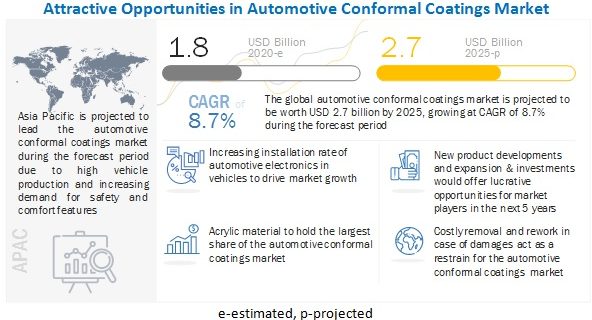
The global automotive conformal coatings market size was valued at USD 1.8 billion by 2020 and is expected to reach USD 2.7 billion in 2025, at a CAGR of 8.7%, during the forecast period 2022-2030. The growth of this market is primarily driven by the increasing automotive electronics in vehicles and various technology advancement in application method of conformal coating.
Increasing adoption of electronics in vehicles
The improving lifestyle and economic status have led to a change in consumer preferences across the globe. Demand for safety and comfort features in automobiles has seen an upward trend in recent years. These features require efficient operation of various ECUs, PCBs, and sensors, among other components.
New vehicles are equipped with in-vehicle air quality systems that use sensors to detect harmful gases entering the vehicle cabin, and if detected, close the inlet air cabin automatically. Sensors also have increased penetration in the overall automotive market with applications in rain sensor, ABS, HVAC control, automatic dimming mirror, and airbag actuation. The increased demand for safety and luxury features from customers has forced OEMs to provide these features in mid-segment cars as well. This has increased the number of sensors in vehicles over the years. According to experts, the number of sensors is projected to be above 250 per car in future. These sensors would require protective conformal coating shields to operate at challenging temperatures, and hence, will drive the market growth for automotive conformal coatings.
ECUs are responsible for controlling the electrical subsystems. In automotive applications, ECUs have wide functionality, from basic ECU that controls the engine and electrical movement of passenger seats to complex ECUs like those responsible for ensuring optimal engine performance based on the input from various sensors. Under the hood, today’s ECUs incorporate microprocessors and can control electronic brakes, transmission, valve timing, and anti-theft systems, among others. Hence these components are coated with conformal coatings to protect them from harsh operating environments. Moreover, protecting these ECUs in EVs is more significant because the ECUs of EVs have a higher ASP (average selling price) than ICEs due to their complexity. This is expected to drive the market for automotive conformal coatings.
PCBsneed to be precise for proper functioning of the engine system, transmission system, steering control system, and safety system. The automotive industry requires PCBs that can withstand high temperatures, moisture, and chemicals such as oils and lubricants. Conformal coatings provide PCBs with uniform conformal coatings to operate in diverse temperatures. According to Dymax, one of the conformal coating manufacturers, the use of PCBs is expected to increase with the rising adoption of EVs, hybrid, and autonomous vehicles, as they are expected to be loaded with more electronic components. Hence, more OEMs have begun to adopt electronic systems and have integrated semiconductor circuits in vehicles. Automotive electronics has become a major differentiated indicator for vehicles. Hence, increasing adoption of these auto electronics is expected to drive the automotive conformal coatings market.
Request Free Sample Report @ https://www.marketsandmarkets.com/requestsampleNew.asp?id=11900039
Technological advancements in conformal coating
Protecting automotive electronics has become more significant over the years, considering the conditions in which these vehicles operate. In modern vehicles, conformal coating is not just required to protect vital components against harsh operating conditions but also to increase surface insulation resistance due to space reduction between tracks. To withstand extreme operating conditions, new types of protective coatings are required. These coatings need to be resistant to moisture and chemicals and highly flexible to survive thermal shock excursions and temperature resistance to survive higher operating temperatures. Automobile electronics are usually required to work between -40¡ãC and 125¡ãC, with rapid transitions between temperature extremes. Large automotive companies, such as Bosch, Continental, and Valeo, are concerned because they use between 10 and 100,000 liters of conformal coatings per year.
With advancements in technology, the coating methodology has also undergone various changes. Materials like parylene are now applied via chemical vapor deposition in a slow and controlled process. Also, this application method being truly conformal ensures no loss in material thickness at the edges of the components, which would normally be an issue with wet coatings.
Asia Pacific is estimated to be the largest market for automotive conformal coatings market
The Asia Pacific is the largest vehicle producer across the globe, with increasing government focus on mandating safety and increasing demand for comfort features. This leads to the growing number of ECUs, PCBs, sensors, and LEDs in vehicles. The high growth rate of these components is expected to attract new investments and expansions from regional and global conformal coating suppliers to cater to this increase in demand.
Key Market Players
The automotive conformal coatings market is led by globally established players such as Dow (US), Henkel (Germany), Chase Corporation (US), H.B. Fuller (US), and Electrolube (UK). These companies adopted several strategies to gain traction in the growing automotive conformal coatings market.
Inquire Before Buying @ https://www.marketsandmarkets.com/Enquiry_Before_BuyingNew.asp?id=11900039

